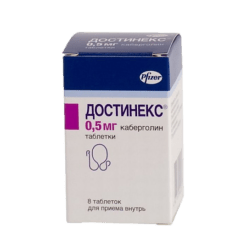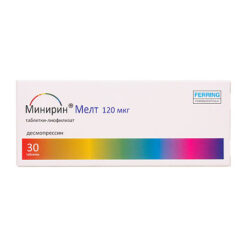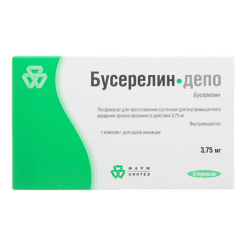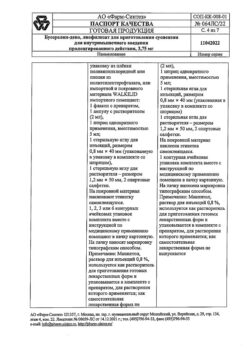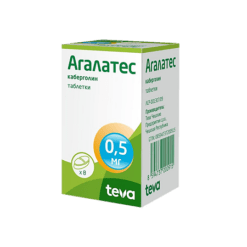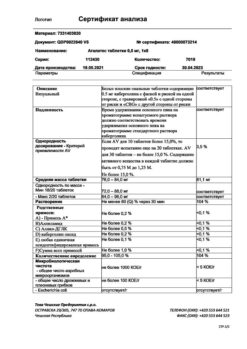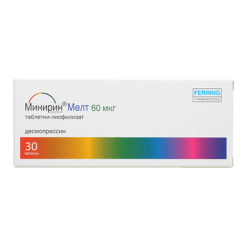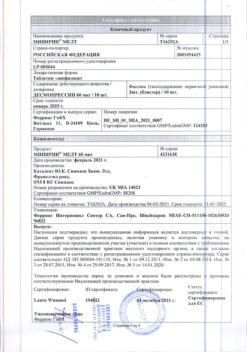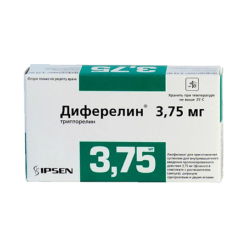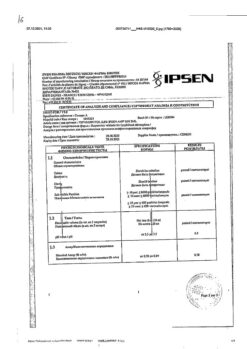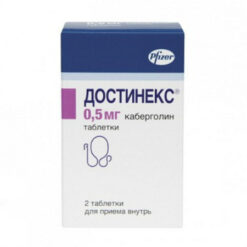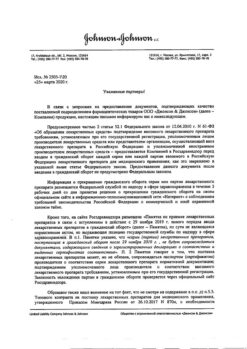No products in the cart.
Minirin, 120 mcg, 30 pcs.
€1.00
Out of stock
(E-mail when Stock is available)
Description
Minirin is a vasopressin-like agent.
Pharmacodynamics
Desmopressin is a structural analogue of arginine vasopressin, a human pituitary hormone. The difference is the deamination of cysteine and the replacement of L-arginine by D-arginine. This leads to a much longer duration of action and no vasoconstrictor effect at all.
Desmopressin increases permeability of distal tubule epithelium and increases water reabsorption, resulting in decreased urine output, increased urine osmolarity with simultaneous decrease of blood plasma osmolarity, decreased frequency of urination and decreased nocturia (nocturnal polyuria).
Pharmacokinetics
The bioavailability of desmopressin in sublingual form in doses of 200, 400 and 800 mcg is about 0.25%.
The Cmax of desmopressin in plasma is reached within 0.5-2 hours after taking the drug and is directly proportional to the amount of dose taken: after taking 200, 400 and 800 mcg the Cmax was 14, 30 and 65 pg/mL respectively.
Desmopressin does not penetrate the HEB. Desmopressin is excreted by the kidneys, T1/2 is 2.8 h.
Indications
Indications
Active ingredient
Active ingredient
Composition
Composition
Active ingredient: desmopressin 120 mcg;
Excipients: gelatin, 12.5 mg; mannitol, 10.25 mg; citric acid, to pH 4.8
Inhibitors: gelatin, 12.5 mg; citric acid, to pH 4.8
How to take, the dosage
How to take, the dosage
The optimal dose of the drug Minirin® is selected individually. The dosage ratios between the two oral forms of the drug are as follows: 0.1; 0.2; 0.4 mg tablets correspond to sublingual tablets of 60; 120; 240 mcg.
Minirin® must be taken some time after meals because eating reduces absorption of the drug and its effectiveness.
Non-sugar diabetes of central genesis. The recommended starting dose of the drug Minirin® is 60 mcg 3 times a day. Subsequently, the dose is changed depending on the therapeutic effect. The recommended daily dose is between 120 and 720 mcg. The optimal maintenance dose is 60-120 mcg 3 times a day sublingually.
Primary nocturnal enuresis. The recommended starting dose is 120 mcg at night. If there is no effect, the dose may be increased to 240 mcg. During the treatment it is necessary to limit fluid intake in the evening. The recommended course of continuous treatment is 3 months. The decision about continuation of treatment is made on the basis of clinical data, which will be observed after discontinuation of the drug for 1 week.
Nockuria. The recommended initial dose is 60 mcg at night. If there is no effect within 1 week, the dose is increased to 120 mcg and subsequently to 240 mcg, with increasing doses at a frequency of no more than 1 time per week.
If after 4 weeks of treatment and dose adjustment there is no adequate clinical effect, continuation of the drug is not recommended.
Interaction
Interaction
Tricyclic antidepressants, SSRIs, chlorpromazine and carbamazepine, which may cause inadequate antidiuretic hormone secretion syndrome, may increase the antidiuretic effect of Minirin® and increase the risk of fluid retention and hyponatremia.
The concomitant use of NSAIDs also increases the risk of side effects.
Combination with loperamide may result in a threefold increase in plasma concentrations of desmopressin and an increased risk of side effects (fluid retention, hyponatremia). There is a possibility that other drugs that reduce intestinal smooth muscle tone and motility may have similar effects.
When Minirin® is concomitantly prescribed with the above drugs to prevent the development of hyponatremia, regular determination of plasma sodium concentration is necessary.
Special Instructions
Special Instructions
It is mandatory to limit fluid intake to a minimum 1 h before and within 8 h after taking the drug in patients with primary nocturnal enuresis. Failure to do so may result in side effects.
Patients over 65 years of age with a baseline low plasma sodium concentration and polyuria of 2.8-3 liters/day have a high risk of side effects.
In cases of acute urinary incontinence, dysuria and/or nycturia, urinary tract infection, suspected bladder or prostate tumor, polydipsia, and decompensated diabetes mellitus, the above conditions and diseases should be diagnosed and treated before treatment with Minirin®.
In acute comorbidities such as systemic infections, fever, gastroenteritis accompanied by fluid and electrolyte imbalances, the drug should be discontinued.
Particular caution is used in elderly patients (65 years and older) due to high risk of side effects (fluid retention and hyponatremia).
When prescribing the drug Minirin® in these cases it is necessary to determine the plasma sodium concentration before the start of the drug, 3 days after the start of administration and at each increase of the dose. It is necessary to monitor the patient’s condition during the whole period of Minirin® administration.
Impact on the ability to drive and operate machinery. Minirin® has no direct effect on the ability to drive and operate machinery. However, fluid retention when drinking disorders or an overdose of Minirin® may cause dizziness.
Contraindications
Contraindications
If a patient has any of the above conditions, he or she should always consult a physician before taking the drug.
With caution: renal failure (Cl creatinine >50 ml/min); bladder fibrosis; water-electrolyte balance disorders; potential risk of increased intracranial pressure; pregnancy; advanced age (65 years and older).
Side effects
Side effects
The most frequent side effects are observed in cases when the treatment is carried out without fluid restriction and fluid retention and/or hyponatremia occur, which may be asymptomatic or manifested by the following symptoms: headache, dizziness, nausea, vomiting, dry mouth, peripheral edema, weight gain; in severe cases – seizures.
If any of the side effects listed in the instructions worsen, or if any other side effects not listed in the instructions occur, you should tell your doctor.
Overdose
Overdose
Symptoms: overdose leads to longer duration of action of the drug and increased risk of fluid retention and hyponatremia. In case of overdose it is necessary to consult a physician.
Treatment: therapy of hyponatremia should be individualized, discontinuation of the drug and cancellation of fluid intake restriction are mandatory. In the presence of overdose symptoms an infusion of isotonic or hypertonic sodium chloride solution is possible. In case of marked fluid retention (seizures and loss of consciousness) furosemide should be prescribed additionally.
Pregnancy use
Pregnancy use
No adverse effects on pregnancy, health of the pregnant woman, fetus or newborn when taking Minirin®. However, caution should be exercised when prescribing the drug Minirin ® to pregnant women.
The dose at which desmopressin can enter the infant with the breast milk of a woman taking high doses (about 300 mcg) of desmopressin is not able to affect the baby’s diuresis. The decision to continue breastfeeding is made if the benefit to the mother exceeds the potential risk to the baby.
Similarities
Similarities
Additional information
| Shelf life | 4 years |
|---|---|
| Conditions of storage | In a dry, light-protected place at a temperature not exceeding 25 °C. |
| Manufacturer | Ferring GmbH, Switzerland |
| Medication form | lozenges |
| Brand | Ferring GmbH |
Related products
Buy Minirin, 120 mcg, 30 pcs. with delivery to USA, UK, Europe and over 120 other countries.



